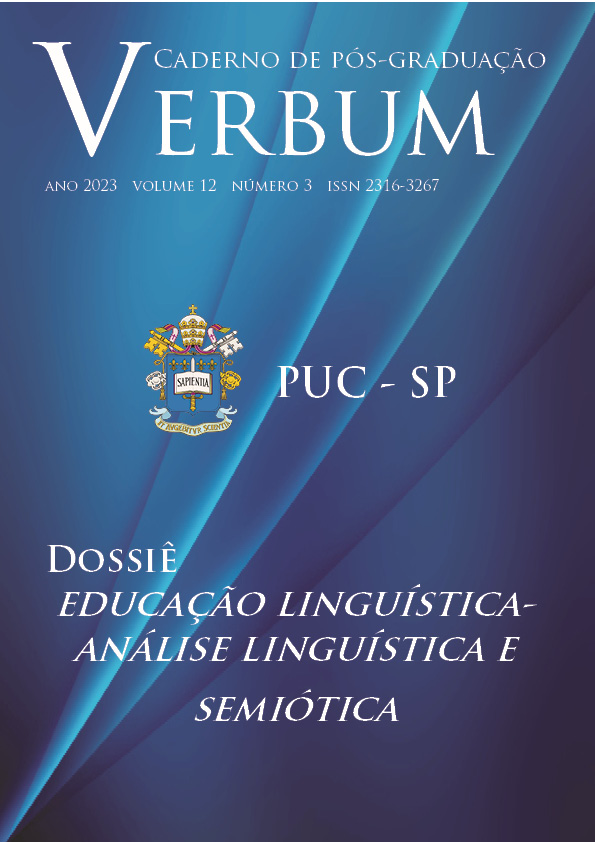O USO DE VOCÊ INDETERMINADOR DE SUJEITO – UMA ÓTICA DA GRAMATICALIZAÇÃO E VARIAÇÃO LINGUÍSTICA
DOI:
https://doi.org/10.23925/2316-3267.2023v32i1p157-172Abstract
ABSTRACT: In this paper, we introduce the pronoun you normatively registered as a pronoun referring to the second person, used as an indeterminating subject pronoun. There are studies performed on this phenomenon, with an analytical focus on oral records; but when it comes to linguistic variation, there is a certain stigma, since the approach occurs largely in the treatment of mostly informal registers. By this paper, through this analysis, we’ll prove that linguistic variation is a common phenomenon in the language from the perspective of grammaticalization based on Cazario, Martelotta and Votre, and we’ll show that the use of you indeterminator of subject is also common in formal writing. To do so, we’ll present the analysis of a lecture about literature transmitted by TV Cultura, in the sunday program Café Filosófico, where, commonly, the speech record is formal. Under the paradigm of grammaticalization, we’ll indicate the linguistic changes that contribute to the historical path of you and the causes that led you to use as subject indeterminator. In the lecture, we found 34 occurrences of you, and in 21 of these the speaker uses the pronoun to indeterminate the subject (including listeners, viewers and readers in general). Analyzes of these occurrences lead us to conclude that you can be used in the second person of singular and third person of singular or plural to indeterminate the subject. However, this use also occurs in the sense of us, in other words, indetermine a group subject that includes, even, the speaker himself.
KEYWORDS: You, Grammaticalization, Lecture
References
REFERÊNCIAS BIBLIOGRÁFICAS
ALMEIDA, Norma Lucia Fernandes de; ASSUNÇÃO, Janivam da Silva. “A gente e você: Formas de indeterminação do sujeito em Feira de Santana-BA”. In: Variação Linguística em Feira de Santana-Bahia. Feira de Santana: UEFS Editora, 2016.
AZEREDO, José Carlos. Gramática Houaiss da Língua Portuguesa. São Paulo: Publifolha, 2008.
BECHARA, Evanildo C. Dicionário Escolar da Academia Brasileira de Letras – Língua Portuguesa. São Paulo: Companhia Editora Nacional, 2010.
CABRAL, Sara Regina Scotta; FUZER, Cristina. Introdução à Gramática Sistêmico-Funcional. São Paulo: Mercado das Letras, 2014.
CANTANHEDE, Caio Sousa. Recursos retóricos para a realização da persuasão implícita em textos argumentativos – Um enfoque crítico da linguística sistêmico-funcional. 2016, 73 f. Dissertação de Mestrado em Linguística Aplicada aos Estudos da Linguagem. São Paulo: PUCSP, 2016.
CARVALHO, Cristina dos Santos; GONÇALVES, Sebastião Carlos Leite. Critérios de gramaticalização. In: Introdução à Gramaticalização. São Paulo: Parábola, 2007.
CASTILHO, Ataliba Teixeira de. A língua falada no ensino de português. São Paulo: Contexto, 2000.
CAZARIO, Maria Moura; MARTELOTTA, Mário Eduardo; VOTRE, Sebastião José. O paradigma da gramaticalização. São Paulo, Cortez, 2011.
CEGALLA, Domingos Paschoal. Nova minigramática da Língua Portuguesa. São Paulo: Companha Editoria Nacional, 2004.
CEREJA, William Roberto; MAGALHÃES, Thereza Cochar. Gramática texto, reflexão e uso. São Paulo: Editora Atual, 1988.
CUNHA, Celso. Gramática do português contemporâneo. Porto Alegre: L&PM, 2010.
PALMA, Dieli Vesaro. “Gramaticalização, pensar metafórico, indeterminação do sentido e ensino de Língua Portuguesa”. BASTOS, Neusa Barbosa (org) In Língua Portuguesa em Calidoscópio. São Paulo: EDUC PUCSP, 2004.


